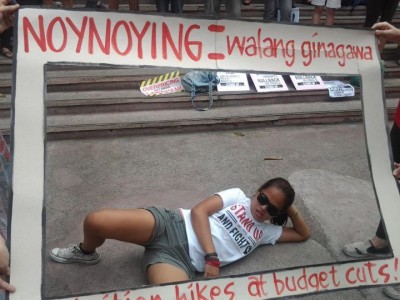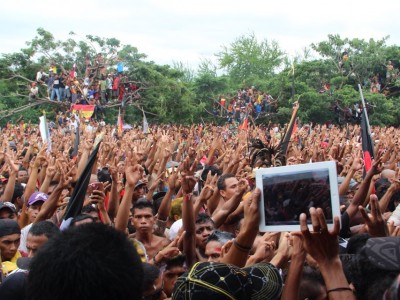Stories about Governance from March, 2012
Iran: A poem dedicated to a blogger who died in prison
Leila Farjami has dedicated a poem to Omid Reza Mirsayafi,a blogger who died in prison three years ago.Read more here.
Slovakia: Corruption, Parliamentary Elections, and SMER's Comeback
The March 10 victory in the Slovak parliamentary elections is not the first one for the SMER-Social Democracy party. Formerly a communist, now a social democrat, the party's leader Robert Fico has won for the third time in a row already. Tibor Blazko provides background on this year's vote and reviews some of the online reactions.
Philippines: Noynoying is the New Planking
Because planking protests are now banned in the Philippines, activists resorted to Noynoying. What is Noynoying and how did it replace planking as a popular protest pose in the country? Noynoying refers to President Noynoy Aquino who is accused by activists of doing nothing to stop the rising prices of oil and other basic goods. Noynoying pictures have gone viral already in the local cyberspace.
Trinidad & Tobago: Protests & Parliament
The Eternal Pantomime suggests that the number of protests taking place is the country is indicative of “the population giving…their response to that Pappy Show of a Parliamentary sitting that happened on March 2nd”, adding: “You don’t insult the intelligence of tax payers and feel that because you have a...
Barbados: Could Bus Accident have been Prevented?
“Why are we so cynical and critical when it comes to mass-casualty bus accidents? We’ve learned to be because there are never any satisfactory answers as to cause or remedial actions taken afterwards”: Barbados Free Press blogs about the country's latest road accident.
Iran: Authorities ‘worried’ about social networks
Hamid Shahriari, a member of newly-formed Iranian National Council of Cyberspace says [fa]: “Social networks have presented so many threats to the country and we are worried about some parts of these networks”. In recent weeks Iranian authorities have asked some users to ‘stop or reduce’ their online activities. In...
Macedonia: Peace March – Enthusiasm, Controversy
The upcoming March for Peace in Skopje has overwhelming support, evident through the positive uproar in social media. Lone voices, however, warn the initiative is used as a PR opportunity by celebrities, and even as a hypocritical alibi for known hatemongers.
Nepal: Why Nepal Is Poor
Chandan Sapkota argues that extractive political and economic institutions are the reasons why Nepal is poor.
Brazil: Demonstration Demands President Veto on Forestry Code
On March 7, Brazilian activists organized an act (#vetadilma) urging President Dilma to veto changes on the new Forestry Code. Biologist Pablo Pessoa published photos and videos of the act, and wrote [pt] about his participation, claiming it was difficult to ensure “preservation or conservation of ecological processes without the recognition by...
Portugal: Visualising Economic and Social Indicators on the Crisis
Conhecer a Crise (Meet the Crisis) [pt] is the name of a recently launched website with info-graphics and visualisations on the main economic and social indicators that describe the current crisis in Portugal. The website has a customisable section [pt] – “The crisis as I see it” – where users...
Cameroon: UN Drinking Water Data under Question
Oriane Alix in Cameroon reacts to the joint press release from UNICEF and WHO that states that 89% of the world has access to drinking water today. She writes [fr] the following on the collaborative blog of the West Africa WASH Journalists Network: “To announce having reached these United Nations Millennium Development...
Africa: A Dumping Ground for Energy-related Waste?
Dr Yves Ekoué Amaïzo, International Finance Consultant, wrote [fr] the following on the website Amaizo Info: “The year 2012 has been chosen as the International Year of Sustainable Energy. Nevertheless, many rich countries dump their nuclear, chemical and electronic waste in Africa in exchange for sums of money that are...
Guinea: Journalist Assaulted by Police Officers
Following an assault on a journalist by overzealous security guards at the Central Bank of Guinea on February 27, there was intense indignation among journalists and Guinean and African bloggers.
Armenia: Parliamentary elections
Writing on Ararat Magazine, Global Voices’ Caucasus Regional Editor interviews analyst Richard Giragosian and examines the political situation in Armenia ahead of parliamentary elections scheduled for 6 May 2012. Following the disputed 2008 presidential election which left 10 people dead, Giragosian argues that the authorities must learn to govern and...
East Timor: Notes on the Presidential Elections
The election campaign in East Timor lasted for 15 days and the voters are now ready to elect a new president. What happened during the campaign period?
Trinidad & Tobago: Political Fiction
The Eternal Pantomime says that it is becoming “very hard…to keep up with the many stories and angles to this new scandal with the PM’s travel assistant”, adding: “This govt is a fiction machine and churns them out faster than the Sweet Valley High series.”
Azerbaijan: Investigative Journalist Defiant After Blackmail Threat
According to Freedom House, Azerbaijan continues “to imprison journalists and bloggers who express dissenting opinions.” However, as one journalist discovered last week, there are other ways to silence critical voices in the oil-rich former Soviet republic.
Brazil: Ministry Silences Report on Human Rights in Belo Monte
Brazilian journalist Leonardo Sakamoto comments [pt] on a news [pt] about a report he wrote for the government that denounces human rights abuses [pt] in the region affected by the Belo Monte Dam. The news points that almost one year after the visit, the report hasn't been formally discussed by...
China: End of Chongqin Model Upon the Removal of Bo Xilai?
The former Chinese Communist Party (CCP) leader of Chongqing, Bo Xilai, has been removed from his post and replaced by Vice Premier Zhang Dejiang. Some believe that it signifies the end of the Chongqing model, which adopts a Maoist populist approach to justify a hard-fist crackdown on organized crime. Does it mean that China will be more open now to initiating political reform?
Hong Kong: Everyday Misery Unaddressed in Small Circle Mayoral Election
On the eve of the election of the Chief Executive in Hong Kong, a netizen presents a video showing the miserable life of Hong Kong people which hasn't been given enough attention in the upcoming small circle election of the city's Chief Executive.
Macedonia: “Who Wants War in Macedonia?”
At civil4tolerance (tolerance-mk) blog, Xhabir Deralla explains why the Macedonian government is responsible for the current rise of interethnic violence.







